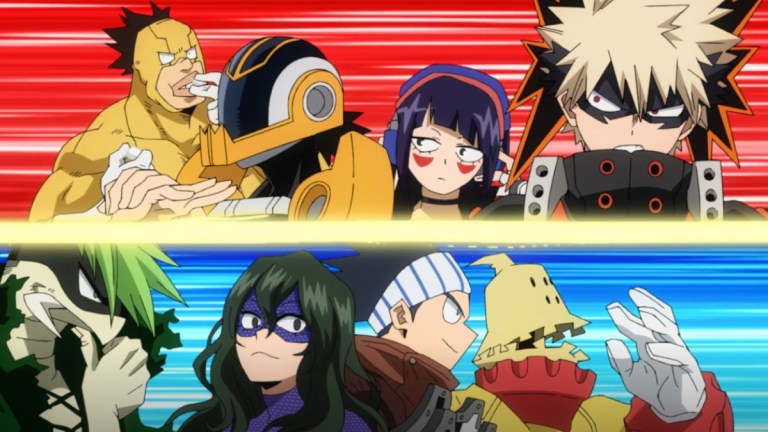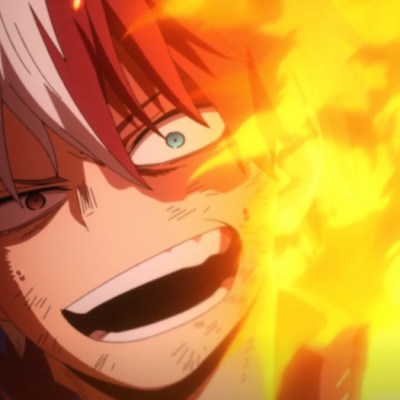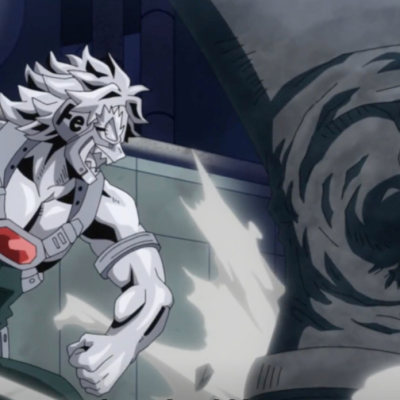My Hero Academia Season 5 Episode 9 Review: Early Bird!
Bakugo reminds everyone why he’s such a fantastic character in an explosive My Hero Academia episode that has everyone at their best.

This My Hero Academia review contains spoilers.
My Hero Academia Season 5 Episode 9
“Save people to win.”
“Win to save people.”
My Hero Academia’s current season has done an excellent job in highlighting many of the series’ more neglected characters, but it’s also functioned as an opportunity to demonstrate how much Class A’s most celebrated heroes have upped their games. My Hero Academia begins with Katsuki Bakugo arguably as the second lead after Midoriya and even though the friendly rivalry between these two has never faded, the two characters have been pulled in very different directions.
Bakugo remains a pivotal character, but the previous seasons largely pull him out of the major battles and leave his progress offscreen. It’s for this reason that “Early Bird!” operates with such an exciting energy because it hinges on Bakugo’s big return and what this “new” version of him is like.
“Early Bird!” is an installment that accentuates the importance of teamwork, but the biggest reason that this episode works as well as it does is because it intentionally plays into both the audience and the characters’ preconceptions around Bakugo. “Early Bird!” comes to life when it dawns on everybody that Bakugo has actually bolstered the perfect team here with a leadership style that both supports and trusts them. Bakugo’s fiery personality will never disappear, but his ego has transformed for the better and it’s a joy to see him receive such a showcase. “Early Bird!” celebrates Bakugo’s power, but also his personality, and it’s a standout entry from the season.
Bakugo and his team are up against some powerful and diverse opponents from Class B and “Early Bird!” goes through a flurry of emotions as Bakugo takes charge. He pushes a tough love approach as a leader and develops a strategy that stems from recklessness and forced opportunities rather than accurately weighing out the situation. Bakugo’s team warns him about Class B’s proficiency with counterattacks, but he largely ignores them in favor of a headstrong rampage. Bakugo’s actions here initially come across as frustrating, but it’s an approach that increasingly makes sense.
The events of seasons three and four made it seem like the more impulsive and self-serving version of Bakugo had shed these unappealing traits. It was only a few episodes back that Bakugo had a mature conversation with Midoriya about power and culpability that’s a testament to how much he’s evolved. It therefore feels somewhat regressive for Bakugo to bully his way into being the leader and push a very selfish strategy that makes him the star, but it turns out there are layers to Bakugo’s attack and it manifests into a triumph of teamwork where everyone shines.
What’s interesting about Bakugo’s approach here is that it almost feels motivated out of fear. He’s determined to use this battle as a chance to prove to everyone–but especially Midoriya–how much he’s improved and why he deserves to be taken seriously. This pressure causes Bakugo to switch into autopilot to some extent, but in doing so it actually reflects how he naturally embodies a hero. Bakugo’s strategy is strangely complex since it doesn’t necessarily minimize his teammates and it actually trusts them with endless freedom. Bakugo basically just tells his team to go nuts with their Quirks so that they can quickly acquire the upper hand and if they happen to panic–hey, that’s what grenades are for.
Bakugo does most of the heavy lifting in “Early Bird!,” but this is also an excellent episode for Jiro–or “Ears,” as Bakugo mockingly refers to her as–that helps legitimize her as a credible hero. Previously, Jiro’s atypical earphone jack Quirk has turned her into a bit of a gimmick at worst and a decent support hero at best. Jiro evolves her Quirk in a way where she can now actually weaponize it and now holds quite the advantage in battle. This battle makes smart use of Jiro’s abilities and the Daredevil-esque way that it visualizes her Quirk gives her even more depth. Jiro’s Quirk also directly comes in opposition with Class B’s Setsuna Tokago, who leads the charge for their team.
Class B’s Setsuna Tokago and her Lizard Tail Splitter Quirk are genuinely frightening. Her Quirk allows her to dismantle her body into fifty separate pieces, which can move around for both reconnaissance or helpful platforms for her team. It’s one of the more conceptual Quirks to come around, but it’s a curious take on camouflage and other reptilian traits. There’s also very much a Sorcerer’s Apprentice vibe as all of these little pieces of Setsuna march together in unison. It’s interesting how between her, Kuroiro, and Togaru “Jack Mantis” Kamakiri, Class B really has some frightening characters that could easily double as villains based on appearance alone.
“Early Bird!” reiterates that Bakugo has something to prove with this fight, but so does the entirety of Class B. The episode addresses the larger reputation of Class A and B and how this competition means more to Class B since this is their opportunity to surpass Class A and rewrite the narrative over which of them is superior. In some ways Class B has a lot more to prove in these battles and that extra level of drive is felt in each Joint Training Arc altercation, but especially so in this one.
There are some tense moments where it looks like Class A is overpowered, but Bakugo rises to the occasion every time and proves how much he care about his team at the same time. He’s willing to sacrifice his own safety to help his team and doesn’t think twice about it. Granted, part of this performance does seem like Bakugo is eager to show off how strong he’s become, but this is far from a hollow act. His bond with his team is genuine. It’s still a very aggressive form of affection, but Bakugo reiterates that he’ll be his team’s safety net so that they can freely function and do their best. He wants to help them become the very best heroes that they can be, even if he’ll throw snide nicknames at them while he does it.
Not only do Bakugo and his team score a perfect win, but they accomplish this in only half of the episode, while the majority of these big battles have taken two full installments to finish. Such flagrant fan service can sometimes feel manufactured and unearned, but Bakugo fans and haters alike should be moved by his victory. This comes at the long tail-end of heavy character development and it hits as hard as it does exactly because Bakugo has been complacent and preoccupied for so long. It’s absolutely adorable when All Might and Midoriya gush over Bakugo’s performance and become his biggest cheerleaders. It shows how far these authentic relationships have come where words of kindness can carry as much impact as the winning blow in a fight.
The results of this fight are satisfying, but it also just looks gorgeous. There’s nearly constant movement and the episode makes this battleground that’s been used for three previous battles still feel fresh. Scenes find fresh ways to explore the space and nothing comes across as recycled or lazy. Kojiro Bondo’s spider-webbing glue adds new variety to the space, especially when Hanta Sero’s dispensed tape also litters the arena. The apex of this battle has everyone throwing Quirks at each other at once and it’s quite a visual masterpiece.
There’s a fearless energy behind this episode’s action that just punctuates the animation. Bakugo catapults through scenes as his explosions pepper the screen and it’s a cornucopia of chaos that’s worthy of Bakugo’s character. It looks beautiful and is lovingly choreographed. These episodes continue to develop inspired ideas that combine Quirks together, like latching Bakugo’s grenade to Sero’s tape, which latches onto Setsuna and turns into a heat-seeking missile in the process.
Additionally, My Hero Academia’s score remains the unsung hero of the season and there are lots of great, new compositions throughout these battles. There are some amazing piano compositions that play during Bakugo and Kamakiri’s showdown that compliments the action so well.
The second half of “Early Bird!” is considerably lighter. Everyone regroups and there’s really not much substance to it, but it’s still a satisfying breather from the episode’s busy first half. It’s important to allow everyone a chance for reflection as the Joint Training Arc heads into its supposedly final battle. Monoma delivers a slightly erratic speech about how everyone in this competition views themselves as their own protagonists and no one is a supporting player. He announces this to inspire those around him, but this message is the subtext that’s been present in every episode of this season. It’s easily one of the most satisfying aspects of these new episodes. In this case, that narrative pushes Bakugo into the spotlight, but “Early Bird!” provides glimpses of each hero that frame them as the centerpieces of their own journeys.
“Early Bird!” is another excellent My Hero Academia episode that effectively combines character and action in a way that subverts expectations, yet simultaneously plays into them. Each battle in this competition teases higher stakes and so it’s only fitting that Midoriya and some other heavy-hitters are about to enter the fray. My Hero Academia’s fifth season begins to prepare for what follows the Joint Training Arc and hopefully it will retain this broader perspective where everyone gets to be their best selves whether a hot-headed hero is screaming in their face or not.


